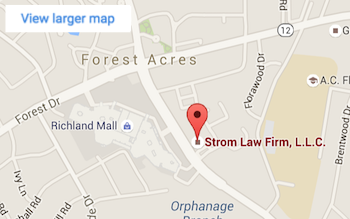What is a South Carolina Qui Tam or Whistleblower Lawsuit?
The False Claims Act, also known as the Whistleblower Act or a qui tam lawsuit, is intended to encourage people to come forward with information and assist the government in stopping the waste of Government funds. It is a provision of the Federal Civil False Claims Act that allows a private citizen to file a suit, in the name of the U.S. Government, charging fraud by government contractors and other entities that receive or use government funds.
These private citizens, known as “relators” or “whistleblowers,” relate information to the government and share in any money recovered. Qui tam lawsuits have been, and continue to be, a very effective and successful tool in combating government procurement and program fraud.
Common whistleblower actions include:
-
Medicare/medicaid fraud
-
kickbacks,
-
Government waste
-
defense contractor fraud, and
-
other kinds of fraud.
To bring a whistleblower qui tam action under the statute, an individual must have personal knowledge and actual evidence of fraud. Successful qui tam claimants will be rewarded a portion of the money the government recovers.
Do You Need a Qui Tam-Whistleblower Lawyer to Bring a Qui Tam Suit?
Technically, no. As a practical matter, absolutely.
In order for a qui tam lawsuit to succeed, a lawsuit must be filed with the federal government. While a person could file a qui tam case without a lawyer, such a case is unlikely to be as successful as it would be if an attorney is involved. Due to the volume of qui tam cases filed with the U.S. Justice Department (over 300 cases per year since 1996), and the limited number of Justice Department lawyers working on them, only those cases that are well presented with strong evidence are likely to be joined by the federal government. Your attorney’s primary responsibility is to help you shape the case and present it to the Justice Department.
While the U.S. Justice Department only joins about 25% of qui tam cases, the cases it does participate in are settled or won over 85 percent of the time. If the Justice Department declines to join your qui tam case, the odds of success drop to 20 percent. While this does not make the suit impossible, it does emphasize the importance of using an attorney from the beginning to present the government with the strongest case possible.
How Can You Afford a Whistleblower-Qui Tam Attorney?
Qui Tam attorneys usually work for a contingency fee. This means that, as a whistleblower, you pay nothing at all to have a lawyer examine your case. If we feel you have a case, we will work with you to determine the contingency fee (i.e. the portion of the relator’s share) that we will receive should the case prevail in court.
What does an attorney bring to the table that justifies a portion of the relator’s share? Experts agree short answer is legal experience, and contacts with the people who can assist you during the development and prosecution of your case. Many cases have been won or lost based on discussions and negotiations with the government. At Strom Law Firm, our attorneys have the experience and the resources to ensure that your case goes smoothly and you get a fair recovery
Under the qui tam provision of the False Claims Act, the relator (plaintiff) files an action on behalf of the U.S. Government. The False Claims Act allows a wide variety of people and entities to file a qui tam action. The more common types of relators include:
Employee Whistleblower Lawsuit:
An employee who blows the whistle on his or her employer (commonly known as a “whistleblower”) is one of the most common types of relators. Many employees normally file qui tam actions against their employers after repeated attempts to resolve the issues internally have met with negative results. This can be as simple as an employee calling into a compliance hotline or something as serious as reporting the incident to a supervisor. However, employees who file a qui tam action, or those that assist in furthering an action, are legally protected against job retaliation by the employer.
Current and Former Federal Employees
One group of employees that have a difficult time bringing qui tam actions are current and former federal employees.
While the law doesn’t exclude federal employees from bringing a whistleblower suit, it raises concerns:
- does a federal employee filing a whistleblower action have a conflict of interest?
- Are federal employees obligated to disclose the fraud to their employer, rather than suing the employer?
The courts have been split on whether a federal employee has standing to bring a qui tam suit, but the fact that the Department of Justice frowns on this type of relator adds to the problem.
Former employees:
Another common type of whistleblower that files a qui tam action is a former employee who has direct knowledge of fraud on the part of their former employer. In many cases, the former employee was terminated, or quit under duress, for trying to blow the whistle internally.
Competitors and Subcontractors:
Another type of whistleblower relator is the competitor of the company being charged or an employee of the competitor who has direct knowledge of the fraud being committed. Also, companies or persons who subcontract with a government contractor can file a qui tam action against the contractor if they have direct knowledge of the fraud being committed.
Call Today to Schedule a FREE Qui Tam Consultation
If you are personally aware of a fraud that has been committed by your current or former employer, a competitor or otherwise and you wish to be a whistleblower, contact the Qui Tam attorneys at the Strom Law Firm today for a no cost consultation to discuss the facts of your case and whether filing a qui tam may be appropriate. You can also speak with one of our qui tam lawyers by call 803-252-4800.




